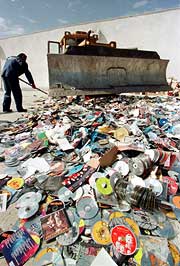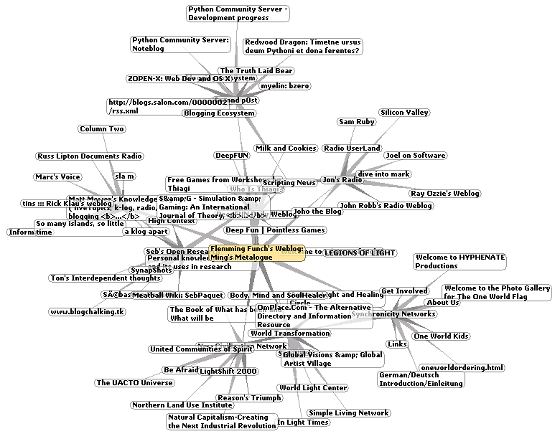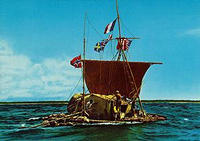| Thursday, February 13, 2003 |  |
|
|
|
The Flash Mind Reader is all the rage today. It seems totally impossible for it to do what it does. I did it a bunch of times and couldn't figure it out. ...But it is ultimately fairly logical. You just need to question some assumptions you took for granted.
[ Knowledge | 2003-02-13 23:59 | | PermaLink ] More >
|
|
| Monday, February 10, 2003 |  |
|
|
|
 Nice article in Technology Review by Nicholas Negroponte (MIT Media Lab). Nice article in Technology Review by Nicholas Negroponte (MIT Media Lab)." Innovation is inefficient. More often than not, it is undisciplined, contrarian, and iconoclastic; and it nourishes itself with confusion and contradiction. In short, being innovative flies in the face of what almost all parents want for their children, most CEOs want for their companies, and heads of states want for their countries. And innovative people are a pain in the ass. [...]
One of the basics of a good system of innovation is diversity. In some ways, the stronger the culture (national, institutional, generational, or other), the less likely it is to harbor innovative thinking. Common and deep-seated beliefs, widespread norms, and behavior and performance standards are enemies of new ideas. Any society that prides itself on being harmonious and homogeneous is very unlikely to catalyze idiosyncratic thinking. Suppression of innovation need not be overt. It can be simply a matter of people’s walking around in tacit agreement and full comfort with the status quo. [...]
Our biggest challenge in stimulating a creative culture is finding ways to encourage multiple points of views. Many engineering deadlocks have been broken by people who are not engineers at all. This is simply because perspective is more important than IQ. The irony is that perspective will not get kids into college, nor does it help them thrive there. Academia rewards depth. Expertise is bred by experts who work with their own kind." Ah yes, how do we teach people to be awake, to think new thoughts, to see things from different angles ...when we mostly are teaching kids in school to be like everybody else? Negroponte does have a point about the U.S. though. The culture in the United States, at least in some major parts, is highly valuing individual creativity and success, and it is very forgiving about failures. And it values the unique perspectives of children, even if the school system doesn't really reflect it. That is quite different from many other countries, and is a big reason why the U.S. traditionally have produced many more innovations into the world than its population would indicate.
[ Knowledge | 2003-02-10 22:46 | 0 comments | PermaLink ]
|
|
|
|
 My three year old daughter is great at learning by mimicking. She will do things sort of like grownups do it. She'll go through the motions, press the buttons, say the words, and often she'll quickly learn to do things for real. She's recently been practicing jokes, and she's mimicked the rhythm really well, even if the punch line isn't strictly speaking funny. Oh, it is very funny when she does it, no matter what the punch line is. It is a great strategy for a baby or a toddler. Just start faking it till you make it. It is delightful and wonderful and entertaining that it works. My three year old daughter is great at learning by mimicking. She will do things sort of like grownups do it. She'll go through the motions, press the buttons, say the words, and often she'll quickly learn to do things for real. She's recently been practicing jokes, and she's mimicked the rhythm really well, even if the punch line isn't strictly speaking funny. Oh, it is very funny when she does it, no matter what the punch line is. It is a great strategy for a baby or a toddler. Just start faking it till you make it. It is delightful and wonderful and entertaining that it works.
But what starts worrying me is that it also seems to be a pervasive principle in education in schools as well. American schools is what I'm talking about. Their homework and essays often adds up to sounding like you're actually talking about something real and useful, even if you aren't. So, if you can just regurgitate some of the materials you've studied, and put together sentences that look fairly correct, you'll do pretty well. And if the components are mostly right, you'll get a good grade. Nobody pays much attention to whether the things you do actually are useful.
I realized some horrible things about education some years ago when it was part of my job to hire computer programmers. I hired a dozen or so programmers over several years. To do that, I had to look through the stacks of thousands of applications we'd gotten, and I needed to interview hundreds of people and pick the ones to hire. And a disturbing picture quickly started forming. Very often, the more advanced a degree the person had in Computer Science, the more hopeless it was to expect them to program anything real. Well, generalizing is dangerous, so let me point out that I'm talking about those who didn't have real jobs as programmers while they were studying, and who didn't spend all their sparetime programming video games. And, don't get me wrong, there are some really useful things on the curriculum in Computer Science, which all programmers really ought to know. What I'm talking about is the people who just went through the college courses and exercises and exams, hoping to be great computer scientists, hoping they'd have a career once they were done. If it were just a Bacherlor's degree, there might be some hope that they could actually program, and that they might apply some of what they learned. If it was a Master's degree, it was probably too late. And the clerk in the store where we bought our computers, he had a Ph.D. in Computer Science, the poor fellow.
The point is that here we have some people who've worked hard for years, and they've learned to get things *mostly* right, who've learned that if they get 80% of the questions right, they're doing well. If they can regurgitate what the textbook says, and make their answers look about right, they do well in school. They've been thoroughly trained and validated into doing things that look sort of right, but which aren't.
The problem is that in the real world, if you have the job of building something that actually works, as a computer programmer or as an engineer, or you need to do something very precise and important, like surgery, you can't get away with anything much less than 100% right. You might get away with 99.99% right, and the last 0.01% will still haunt you. But if you're several percent off, the bridge will fall down, the patient will die, and your software just won't run. You can't *almost* save an account record and still call it an accounting program. It doesn't matter if you made a good effort and that your notes look good if you amputated the wrong leg.
I solved my hiring problem by giving people actual tests that involved solving a problem by writing a program, and I hired the people who wrote a working program. The best programmer I hired was a 19 year old guy fresh out of highschool.
The bigger point I'm trying to make is that a large percentage of the human population, even as grownups, are just mimicking what others are doing, regurgitating what they've heard, and trying to look right. And a surprisingly small percentage of people are actually thinking through and figuring out how to make things work.
And the horrifying thing is that sometimes whole countries are run by people who're just actors who're kind of winging it and trying to say things that sound about right. And they gather people around them who're good at making things sound like they know what they're talking about. And when they say these things in the media, lots of people will repeat them, and will go around talking about stuff they really have no clue about, but they know how to act as if they do.
[ Knowledge | 2003-02-10 21:48 | | PermaLink ] More >
|
|
| Wednesday, February 5, 2003 |  |
|
|
|
 "Time is that quality of nature that keeps events from happening all at once. Lately it doesn't seem to be working." --Anonymous
My copy of "Getting Things Done" by David Allen arrived today. Matt Mower recommended it. I'm excited. I paged through it and read the first chapter. It might just keep me from going insane. It is all about unloading ALL the stuff floating around in your mind which you sense you ought to be doing something about, and putting them into a system you can trust to be able to find them in again, so that you can relax and enjoy life in the moment without worrying about mountains of incomplete and ill-defined tasks."There is usually an inverse proportion between how much something is on your mind and how much it's getting done." It is close to 20 years ago since I last felt really organized. It involved In-, Pending- and Out-baskets on my desk. It involved daily to-do lists, with items I could happily check off during the day. It involved a routine of Do It, Delegate It, File It, or Toss It, with every item that came to me. And it involved a filing cabinet with folders with nice labels on. Unfortunately the world has changed since then. It was before e-mail and cellphones for one thing. And everything is now more fast, more fuzzy, more multi-dimensional, and there's a hundred times more of everything. Something better is needed. I think I once again have hope, that I might possibly once more become organized and stress-free.
[ Knowledge | 2003-02-05 19:30 | | PermaLink ] More >
|
|
| Friday, January 31, 2003 |  |
|
|
|
 Steve Gillmor interviews John Perry Barlow on his opinions of DRM (digital rights management), intellectual property law, and copyright extension. John is always worth listening to, and he has important things to say. Steve Gillmor interviews John Perry Barlow on his opinions of DRM (digital rights management), intellectual property law, and copyright extension. John is always worth listening to, and he has important things to say."I think that anybody who cares about the future of technology -- anybody who cares about the future, period -- ought to be awfully concerned about this. But people who work in technology have been agnostic on the subject so far. They need to recognize that they're going to be faced with a fairly stark choice, which is a gradual concentration around certain trusted platforms that cannot be broken out of and are filled with black boxes that you can't code around and can't see the inside of.
You have to get politically active and stop it from happening, because Congress has been bought by the content industry. The choice is being made at a very complex and subterranean political level. It's being done in standard settings, with the FCC, in amendments to obscure bills in Congress, in the closed door sessions to set the Digital Broadcast Standard. It has very significant long-term effects [for] the technical architecture of cyberspace, because what we're talking about embedding into everything is a control and surveillance mechanism for the purpose of observing copyright piracy, but [it] can be used for anything." And as an answer to the question of why it is so difficult to present the case that fair use needs to be protected he says:"It's a difficult proposition because the content industry has done a marvelously good job of getting people to believe that there's no difference between a song and a horse, whereas for me, if somebody's singing my song, I think that's great. They haven't stolen anything from me. If somebody rides off on my horse, I don't have anything and that is theft. Otherwise intelligent people think that there's no difference between stealing my horse and stealing my song. [The content industry] has also managed to create the simplistic and basically fallacious notion that unless we strengthen dramatically the existing copyright [regime], that artists don't get paid anymore. First of all, artists aren't getting paid much now. Second, making the institutions that are robbing them blind even stronger is not going to assure [their] getting paid more. And it's going to make it very difficult for us to create economic [and] business models that would create a more interactive relationship with the audience, which would be good for us economically and good for us creatively."
[ Knowledge | 2003-01-31 16:05 | | PermaLink ] More >
|
|
| Thursday, January 30, 2003 |  |
|
|
|
 The Economist has an excellent article about copyrights, suggesting an overhaul to the current system. Big media companies in the U.S. have recently been successful in extending the copyrights they 'own' far beyond what was originally intended when copyright was invented. The Economist has an excellent article about copyrights, suggesting an overhaul to the current system. Big media companies in the U.S. have recently been successful in extending the copyrights they 'own' far beyond what was originally intended when copyright was invented.The alternative is to return to the original purpose of copyright, something no national legislature has yet been willing to do. Copyright was originally the grant of a temporary government-supported monopoly on copying a work, not a property right. Its sole purpose was to encourage the circulation of ideas by giving creators and publishers a short-term incentive to disseminate their work. Over the past 50 years, as a result of heavy lobbying by content industries, copyright has grown to such ludicrous proportions that it now often inhibits rather than promotes the circulation of ideas, leaving thousands of old movies, records and books languishing behind a legal barrier. Starting from scratch today, no rational, disinterested lawmaker would agree to copyrights that extend to 70 years after an author's death, now the norm in the developed world.
Digital technologies are not only making it easier to copy all sorts of works, but also sharply reducing the costs of creating or distributing them, and so also reducing the required incentives. The flood of free content on the internet has shown that most creators do not need incentives that stretch across generations. To reward those who can attract a paying audience, and the firms that support them, much shorter copyrights would be enough. The 14-year term of the original 18th-century British and American copyright laws, renewable once, might be a good place to start.
[ Knowledge | 2003-01-30 23:47 | 0 comments | PermaLink ]
|
|
| Monday, January 27, 2003 |  |
|
|
|
Michael Wilson lists a long list of techie program functions he's like on his computer, starting:A real-time ticker application that will be updated using RSS. (Not the current "refresh to update" silliness in aggregators of today)
Publishable schedule items (to the rest of the world or a specific subset at my option)
To subscribe to lists of events that are occurring around my area geographically, and virtually and have those events appear in a calendaring application.
To use a blog or blog-like publishing environment (I'm thinking Zope with CMF) for a personal desktop heads-up-display console from which I work at all times. and going on for a while. I think about lists like that too, and I'd like a number of the things he lists. Being a programmer makes one believe one can make things so they're exactly to your liking. And one can, when we're talking about how your information is organized. Unfortunately there are still not good enough tools to get me what I want without some heavy duty programming. Personally I hadn't had time to do most of it, so I'm suffering in some areas. I can easily think of things I'd want to be done differently about my e-mail storage, and it is a mess, but I haven't given it enough priority to go and program it myself, even though I know I could.
[ Knowledge | 2003-01-27 12:08 | 0 comments | PermaLink ]
|
|
|
|
 James Snell talks about being in control of one's own identity and storing it on one's own site, like as part of one's weblog: James Snell talks about being in control of one's own identity and storing it on one's own site, like as part of one's weblog:"A discussion on Sam's blog got me thinking about self-hosted identities. Ideally, I should be able to put together a file, discoverable through my weblog, and digitally signed with my private key that contains all of the personal information that I want to make public. When I go to any type of forum (like a weblog) or to a commercial site (like Amazon), if they want my information, they would do what Dave suggests and put a "You know me" button on their page. When I go to the site, I click on the button, the site asks me for the location of my identity file. They download the file and extract the necessary information." And he follows up here and here. We need that, of course. I'm tired of having entered my information on dozens of different sites over the years, and it being mostly outdated and forgotten. Much better that it is on my computer.
[ Knowledge | 2003-01-27 12:08 | | PermaLink ] More >
|
|
| Wednesday, January 22, 2003 |  |
|
|
|
 So, do I want to categorize things when I store them, or do I just want flexible ways of searching for things later on? I'm talking about the filing system(s) in my life. My e-mail archive, my personal databases of things I need to remember. Until now my vision has been that a sufficiently multi-dimensional system could be devised where I could easily assign a piece of information to a number of different categories while I'm in the process of saving it, even being able to make up new classifications on the fly. And then, later, when I need to find the information again, it is already classified in a number of different useful ways, as many ways as I feel like, and chances are that one of them is what I need. By date, by location, by people involved, by subjects, by reference to other items, etc. So, do I want to categorize things when I store them, or do I just want flexible ways of searching for things later on? I'm talking about the filing system(s) in my life. My e-mail archive, my personal databases of things I need to remember. Until now my vision has been that a sufficiently multi-dimensional system could be devised where I could easily assign a piece of information to a number of different categories while I'm in the process of saving it, even being able to make up new classifications on the fly. And then, later, when I need to find the information again, it is already classified in a number of different useful ways, as many ways as I feel like, and chances are that one of them is what I need. By date, by location, by people involved, by subjects, by reference to other items, etc.
But the first problem is that no matter how easy the user interface is, I will quickly become tired of categorizing things. I'm already getting way too much e-mail, and even the job of going through it and deleting it, or filing it in even one folder is beginning to be too much work for me. So, would I really want to have to select from dozens of different pulldown lists whenever I file an e-mail? Probably not.
The second problem is that I don't know what my main categories of interest will be next year. I change often, and next year I mostly likely will have a list of new ways of categorizing things, which I couldn't think of now. But am I then going to go back and apply those categories to all my old information? No, I won't have time for that.
So, I must admit that what I really want is that when I need something, I will get it, in an organized, complete and sensible fashion. I want to say "Computer, give me a list of all the people I have sent e-mail last year!". And when I get the list, I want to say "Sort them in order of volume of mail", and then "Correlate the top 10% with the list of people who've called me on the phone". I want the freedom to make it up on the spot. And I don't want to have had to predict that query a year earlier. I don't want to have had to select a dozen pulldown menus on a screen whenever I get a phonecall. I just want to, at best, answer my phonecall.
What I need is apparently an AI that records everything that happens to me, and that is smart enough to be able to give me a complete list of relevant, cross-indexed information, whenever I desire it. Please.
[ Knowledge | 2003-01-22 23:59 | | PermaLink ] More >
|
|
| Monday, January 20, 2003 |  |
|
|
|
 Charles Miller: Charles Miller:"I no longer want to know where my files are stored. I no longer care. I have hordes of directories on my various computers called stuff, downloads and documents, and the effort that it would take to organise them into a proper heirarchy is just not worth it. The heirarchical filesystem is a really wonderful thing for programmers and websites, but it just doesn't cut it for personal use. I no longer care where my files are stored." Leslie Michael Orchard:"I'll be burned at the next stake over from Charles when the time comes, for this filesystem heresy. Just the other night, a co-worker was asking me about how diligent I was in organizing my email. I told her, "Not at all. I leave it all in one pile and then run the Find command on it later." She was shocked that I, alpha geek and info freako, didn't have some intricate taxonomy of folders into which mail was sorted by carefully crafted filters.
Here's what I want to see: Storage without explicit organization, but with super-rich metadata for super-fast searches. Allow me to create views made from persistent searches - my "project folder" is simply a collection of resources tied together by a common tag, one of many. And, if I want to form a project hierarchy, make my persistent searches into file objects too. The main thing in all this, though, is that it be woven very deeply within the OS. I don't want a helper app. I want this to replace the standard metaphor completely." Yep, I think that's what I want too. The thing is that the world we live in is no longer hierarchical. Any piece of information fits into a bunch of different structures in different ways, depending on what I'm trying to do. If I go and drop the item in a file in a folder in a filing cabinet, in the place that seems logical at the time, chances are I won't find it next time I'm looking for it. So, yes, maybe there is no good way of easily storing it multi-dimensionally. Maybe the best is to store some concise information about the information (which is called metadata), such as date, person, relations to projects, interests, etc. and then leave it up to an efficient search engine to find things by those keys later on.
[ Knowledge | 2003-01-20 15:43 | | PermaLink ] More >
|
|
| Monday, January 13, 2003 |  |
|
|
|

If you have a website and your browser does Java, you can go to the TouchGraph GoogleBrowser and see what sites are linked with yours, or with any other site you want to look at. Above is what I saw when I put in ming.tv. Very cool. I'm not entirely sure what it means. I suppose it shows the most highly linked, or most recently linked sites most prominently, but I really don't know. Now, I'd love to actually navigate around cyberspace in a more spatial sense like that. I just haven't seen any technology yet that makes it truly useful. This is cool, and I might see some things I hadn't noticed, but I wouldn't think of treversing the net this way if I actually were looking for something. Showing websites as blobs with lines between them still doesn't add up to visualizing the actual information stored on the net.
[ Knowledge | 2003-01-13 03:36 | | PermaLink ] More >
|
|
| Friday, January 10, 2003 |  |
|
|
|
Dan Gillmor writes in 'Here comes We Media' about two-way media. Knowledgable readers don't want to just sit and read what other people are writing - they want to talk back, and add in what they know. Journalism is evolving away from a lecture mode, towards being a conversation. Weblogs illustrate that, of course. It requires that the writer has the humility to realize that his readers probably know more than he does. Or, rather, collectively they absolutely, certainly know more than you do."In 1999, Jane’s Intelligence Review, the journal widely followed in national security circles, wondered whether it was on the right track with an article about computer security and cyberterrorism. The editors went straight to some experts — the denizens of Slashdot, a tech-oriented Web site — and published a draft. In hundreds of postings on the site’s message system, the technically adept members of that community promptly tore apart the draft and gave, often in colorful language, a variety of perspectives and suggestions. Jane’s went back to the drawing board, and rewrote the article from scratch. The community had helped create something, and Jane’s gratefully noted the contribution in the article it ultimately published."
[ Knowledge | 2003-01-10 23:59 | 0 comments | PermaLink ]
|
|
| Wednesday, January 8, 2003 |  |
|
|
|
 Many people are exploring and expanding what blogging is, finding new ways of doing it, or discovering what it really about. What I didn't quite catch at first is that it is inherently about sharing in near real-time what is going on somewhere for somebody. It is not just about writing, but it is a kind of thing that is in the same category as a webcam. You know, cameras that take live pictures from some street corner, or from inside somebody's house, where you can always check in and see what is happening. A weblog is about that too. You can always check in and see what is going on in a certain frame of reference. In somebody's mind, in their life around town, within a certain group, or in a certain physical location. Many people are exploring and expanding what blogging is, finding new ways of doing it, or discovering what it really about. What I didn't quite catch at first is that it is inherently about sharing in near real-time what is going on somewhere for somebody. It is not just about writing, but it is a kind of thing that is in the same category as a webcam. You know, cameras that take live pictures from some street corner, or from inside somebody's house, where you can always check in and see what is happening. A weblog is about that too. You can always check in and see what is going on in a certain frame of reference. In somebody's mind, in their life around town, within a certain group, or in a certain physical location.
Chris Corrigan just pointed geographical blogging out to me. He runs the Bowen Island Journal, a blog about what is going on on Bowen Island, just off the west coast of Canada, which is where he lives. Imagine if most places had their own blog. Imagine it included a webcam, so you could always go and see how it looks there right now. Better yet if it were a 360 degree virtual reality thing.
On the subject of geographical blogging, the GeoURL site shows blogs across the world on a world map, and you can find blogs that are physically adjacent to you or to your own blog.
I'm in Van Nuys, California, which is located roughly at 34.200568 degrees northern lattitude and 118.486821 degrees western longitude. You can go and find blogs geographically adjacent to me. Hm, that's kind of interesting. I don't know any of those people. Now I just want it in real time with a GPS thing.
[ Knowledge | 2003-01-08 23:36 | 0 comments | PermaLink ]
|
|
| Sunday, December 29, 2002 |  |
|
|
|
SmartMobs mentions these notes from a 2000 seminar on 'Clustering and Swarming as self-organising techniques in virtual communities', which is very interesting stuff. Specifically it talks about tacit knowledge and the fallacies involved with trying to manage and represent knowledge in any finite way. Hard to quote, because it is all good, but here, about what knowledge is:"If the problems are large in defining human organisations in a behaviouristic way then we have to go to language and culture in order to make sense of them. 'Information space', or the realm of legitimate knowledge inside the language and the culture is 'multidimensional' - which means it can be cut up in many different ways. The problem of attribution is a social one and at the microlevel comes down to value judgments. It can be looked at the macrolevel in terms of the collective sympathy or resistance which determines whether or not an idea is taken up. Knowledge management is therefore not really about 'managing' the knowledge or skills which people have within an organisation but in 'making sense' of why something happened and trying to influence the future by such intelligence." And here is an abbreviated version of the seven sins (mis-conceptions) of knowledge management:- That knowledge can be managed [Too tacit, dynamic and complex]
- That organisations can be 'designed' [Real organizations are too complex and organic]
- The myth of the rational agent [People are not just motivated by data]
- Utilitarianism [People don't always do what they do because they expect a return]
- A belief in Utopia [The real world isn't made of glib generalizations]
- A belief in 'best practice' [Circumstances change]
- The organisation is merely a collection of individuals [Optimized individuals might not make an optimized organization]
The comments are mine. Read the real text which is better. Then, here's an example from IBM of how to use tacit knowledge:"IBM now have a search engine called 'tacit' that can trawl the 'team rooms' on the intranet and pick up any key words that might give a clue to information on any current problem that they have. An e-mail is then sent requesting help and a task force can be quickly assembled. But privacy is respected in that only key words and not text are picked up. Also whether a person responds is up to them. If for example you are looking for an expert on 'story' you may not pick up David Snowden's but he gets informed that you are looking. If he knows that you are a person that's likely to steal his ideas he doesn't respond. If you're someone that he knows and trusts then he might phone. In a bureaucratic organisation the thief would prosper but in this kind of 'shadow' system he or she gets starved of the access to knowledge on which the exploitation depends." And, from a comment on SmartMobs, here are some ideas behind the company Tacit's products:- Most knowledge lives in people's brains.
- Most evidence of what each person knows lives in their email archives.
- Knowledge flowing is more important that knowledge filed away.
- Email archives provide opportunities for social network analysis (SNA) and social filtering.
- People hate filling in complex forms.
- People want control over sharing personal metadata (who I am and what I know).
Hm, lots of food for thought there. Essentially, rather than trying to constuct perfect structures for representing knowledge in some universally perfect way, mine tacit knowledge from more incidental information sources. Don't expect people to go and record it the right way themselves, but use indirect ways of figuring it out, based on what people do and say and who they interact with.
[ Knowledge | 2002-12-29 22:03 | 0 comments | PermaLink ]
|
|
| Saturday, December 28, 2002 |  |
|
|
|
 The publishing world is giving itself a lot of extra work because it hasn't yet discovered stuff like Creative Commons. I was just contacted by a major book publisher that wanted to get permission to use something I've written in a book of theirs. Quite a few people have asked to use stuff I've written in books or articles or pamphlets, but usually it has been a friend thing of somebody calling me and asking if it is OK, and I say "Sure, use whatever you want", and I don't even keep track of it. So this was the first time it was a formal thing. First they contact me to be sure they can find me, and a few weeks later they send me forms to fill out and sign and get back to them. Actually it is a separate company doing all of this, as I assume they need to do a whole lot of it, so they contract it out. In this case, after several messages back and forth, and forms and so forth, it turns out that they were talking about something I didn't write. An old entry about LETS systems in Global Ideas Bank. It is on my server, and I did the database, but I don't administer it, and the content is aggregated by hundreds of different people who have sent it in. Which obviously is something that confuses traditional publishers. Btw they didn't even copy it - they paraphrased a few paragraphs, and left out the actual details. And they still felt they needed to ask for written permission to paraphrase two paragraphs. The biggest problem here is that copyright law tells them that everything is copyrighted (owned and restricted) by somebody, unless they specifically have been told otherwise. Creative Commons does it the another way around. You're told up front what you can use and how. The publishing world is giving itself a lot of extra work because it hasn't yet discovered stuff like Creative Commons. I was just contacted by a major book publisher that wanted to get permission to use something I've written in a book of theirs. Quite a few people have asked to use stuff I've written in books or articles or pamphlets, but usually it has been a friend thing of somebody calling me and asking if it is OK, and I say "Sure, use whatever you want", and I don't even keep track of it. So this was the first time it was a formal thing. First they contact me to be sure they can find me, and a few weeks later they send me forms to fill out and sign and get back to them. Actually it is a separate company doing all of this, as I assume they need to do a whole lot of it, so they contract it out. In this case, after several messages back and forth, and forms and so forth, it turns out that they were talking about something I didn't write. An old entry about LETS systems in Global Ideas Bank. It is on my server, and I did the database, but I don't administer it, and the content is aggregated by hundreds of different people who have sent it in. Which obviously is something that confuses traditional publishers. Btw they didn't even copy it - they paraphrased a few paragraphs, and left out the actual details. And they still felt they needed to ask for written permission to paraphrase two paragraphs. The biggest problem here is that copyright law tells them that everything is copyrighted (owned and restricted) by somebody, unless they specifically have been told otherwise. Creative Commons does it the another way around. You're told up front what you can use and how.
[ Knowledge | 2002-12-28 15:32 | 0 comments | PermaLink ]
|
|
| Monday, December 23, 2002 |  |
|
|
|
 Buckminster Fuller defining wealth: Buckminster Fuller defining wealth:"Wealth is the performance per pound utilization of the world's resources. It is the number of forward days that the number of people on earth can live at an increasingly higher standard of living without the negative effects of environmental pollution." Here's another version:"Intellect and energy; measured by the amount of forward days for how many humans with which we are technically organized to cope. Because energy can neither be destroyed nor created, and 'know-how' of intellect can only increase with each experiment, or experience, wealth consisting of both the physical and metaphysical can only increase with each and every re-employment."
[ Knowledge | 2002-12-23 04:08 | | PermaLink ] More >
|
|
|
|
 Timothy Wilken writes: Timothy Wilken writes:"Today, mind and brain scientists have made enormous progress in understanding how the human brain works. There has been many surprises in these recent advances. But the biggest shocker is that the brain doesn't decide what to do. Decision making is not controlled centrally in the brain. The mind-brain appears to act as a coordination and consensus system for all the cells, tissues, and organs in the body. The brain doesn't decide to eat. The cells of the body decide to eat, the brain coordinates their activity and carries out the consensus will. Our human brain stores the gathered information from the body's sensing of its environment, the brain presents opportunities for action reflective of both the sensing of environment and the needs and goals of the 40,000,000,000,000 cells it serves. The brain is not the leader of the body, it is the follower of the body. It is a system that matches needs in the body with its sensing of opportunities to meet these needs by action within the environment. The brain is a 'government' that truly serves its constituents– the cells, tissues, and organs that make up the human body. The apparent " I " is not real. It is really a " We ". ... If the human body can using unanimous rule democracy and synergic consensus can organize and coordinate the actions of 40 trillion cells so totally that we identify the whole organism as a single individual, then we humans should be able to use these same mechanisms to organize our species and solve our human problems..."
[ Knowledge | 2002-12-23 03:17 | | PermaLink ] More >
|
|
| Thursday, December 19, 2002 |  |
|
|
|
 I was listening to a tape by anthropologist and shaman Hank Wesselman, of a session I missed at the Prophet's Conference, and he introduced a shamanic journey and started drumming. The idea was that one would go to one's garden in the dreamworld and receive some wisdom or meet somebody. I stopped the car, and sat in the dark. I was listening to a tape by anthropologist and shaman Hank Wesselman, of a session I missed at the Prophet's Conference, and he introduced a shamanic journey and started drumming. The idea was that one would go to one's garden in the dreamworld and receive some wisdom or meet somebody. I stopped the car, and sat in the dark.
My garden had a waterfall and a jungle and a lot of land to explore, and caves. I went into a cave which went down, taking several turns and forks. There I had a vision, in the form of a multi-dimensional lightshow of sorts. It is hard to describe, but there was a mirror effect going off into several dimensions at the same time. Almost a thru-the-lookingglass thing in several directions. You can't reflect yourself in a mirror without having, well... a reflection. Action and Reaction, or rather, both at the same time. And there seemed to be some wisdom there, applying to knowledge and how to organize it.
As I came out of it, sitting in the dark, I still didn't quite get it, but I figured I'd better write it down, as it might fall into place later. But what I think of right away is: information is usually disconnected from what it is about. You write or talk about something or someone, and they don't necessarily know, and there's no mechanism for ensuring it is valid or useful. If they move or change, your words don't move or change with them. But in a way, they should. Our information is often like pieces of paper we crumble up and throw in the general direction of what we're talking about. But it should really be like rubber bands attached to what we're talking about, stretching and following. A two-way link. Is that maybe a difference between information and knowledge? Information is disconnected and static, but knowledge is connected and fluid? If you move, the reflection in the mirror moves. If you walk away, the reflection walks away. But there are many mirrors we're reflected in simultaneously, so as we walk away from one, we might get closer in another.
[ Knowledge | 2002-12-19 01:40 | | PermaLink ] More >
|
|
| Wednesday, December 18, 2002 |  |
|
|
|
Philippe Beaudoin has some good thoughts about weblogs as meta search engines. Rather than just directly looking for information within all the information in the world, a weblog makes certain indirect factors much more important, and it makes it more potentially useful to go off on a tangent. If you find a story that you think is important and useful on somebody's weblog, chances are that you would like other things in the same weblog, even if they are on totally different topics, and chances are good that you will like the stuff on other weblogs that this person is recommending. Automated tools might take that into consideration. For example, an approach similar to Google's PageRank might allow you to assign a value to a certain weblog, and automatically it will rub off on weblogs that are related to that one. That will enable you to better navigate a network of weblogs that is likely to give you stuff you want. And it opens the door to more productive randomness. That is something I like pursuing as well - intelligent randomness, increasing the occurrence of synchronicity. It is often stimulating to be thrown off a bit in a direction different from what you would expect, but only if some pre-selection has taken place. Most of the 100,000 weblogs are quite uninteresting to me, but I'd like to be exposed to unexpected stuff at the edge of what I'm aware of. A friend of a friend whom I don't know yet.
[ Knowledge | 2002-12-18 16:04 | | PermaLink ] More >
|
|
| Tuesday, December 17, 2002 |  |
|
|
|
 The Creative Commons is now officially open, since yesterday. It is an organized effort of helping people to choose and express the proper license for their creative works. Specifically, the intention is to help people selectively share their materials, while still maintaining ownership. E.g. you might allow free distribution for non-commercial use. The site will help you easily choose what license is best for you. Personally I prefer Public Domain, which is not really a license, as there is no restrictions. But the Creative Commons categories are great for anything that lies somewhere between All Rights Reserved (don't ever touch my stuff) and Public Domain (do whatever you feel like). There's a great Flash presentation about it here. The Creative Commons is now officially open, since yesterday. It is an organized effort of helping people to choose and express the proper license for their creative works. Specifically, the intention is to help people selectively share their materials, while still maintaining ownership. E.g. you might allow free distribution for non-commercial use. The site will help you easily choose what license is best for you. Personally I prefer Public Domain, which is not really a license, as there is no restrictions. But the Creative Commons categories are great for anything that lies somewhere between All Rights Reserved (don't ever touch my stuff) and Public Domain (do whatever you feel like). There's a great Flash presentation about it here.
[ Knowledge | 2002-12-17 16:57 | | PermaLink ] More >
|
|
<< Newer stories Page: 1 2 3 4 5 6 7 Older stories >> |

